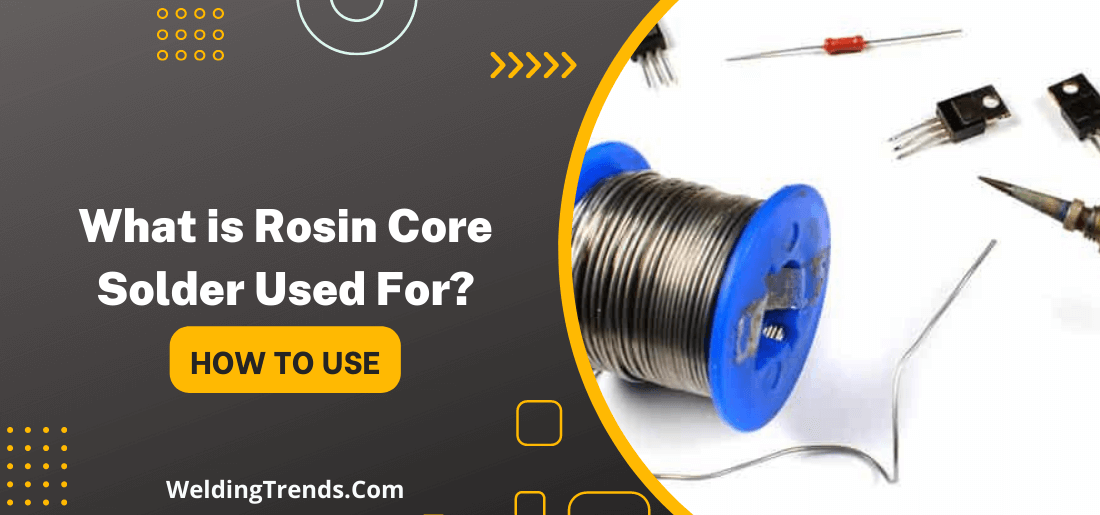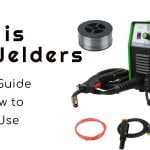Rosin core solder is an alloy that is made up of different metals. It contains a flux core which helps to clean the surfaces of the metals that are being soldered and also helps to protect them from oxidation.
When it is heated, the rosin component melts and flows evenly between the two surfaces, creating a strong bond. In most cases, rosin core solder provides a much stronger connection than other forms of solder.
what is rosin core solder used for?
Rosin core solder is a type of solder that contains a rosin flux core. This flux helps to clean the metal surfaces as the solder is being applied and also prevents oxidation of the metals being joined.
Rosin core solder is used for electrical and electronic applications where a clean, strong joint is required. It can be used on copper, brass, iron, steel, nickel and tin, as well as some plastics and ceramics.
When soldering electronic components, it is important to use the correct type of solder for the application. Using a rosin core solder will ensure that the joint is strong and free of oxidation.
How to use rosin core solder?
To use rosin core solder
- First, tin the tip of your soldering iron by applying a small amount of solder to it.
- Next, touch the rosin core solder to the joint you wish to solder and heat both the joint and the solder with the soldering iron until the solder melts.
- Finally, remove the iron and allow the joint to cool.
If you need to solder a joint that is difficult to reach, you can use a soldering iron with a long tip or a soldering gun.
Soldering guns have much higher temperatures than regular soldering irons and are not recommended for use on delicate electronics.
Benefits of using rosin core solder
The following are the benefits of using rosin core solder:
- Rosin core solder is much easier to work with than other types of solder. It provides several advantages over other types of solder, including better wetting, less mess and easier cleanup.
- Rosin core solder is also less likely to cause problems such as short circuits and dry joints.
- It is also less likely to pull components off the board during soldering.
- Rosin core solder is available in a variety of different alloys, each with its advantages and disadvantages. The most common alloys used in electronics are lead-free, tin-lead and silver-bearing.
- Lead-free rosin core solder is the most environmentally friendly option, but it can be more difficult to work with than other types of solder.
- Tin-lead rosin core solder is the traditional choice for electronics work and it is generally the easiest type of solder to use. However, it is not as environmentally friendly as lead-free solder.
- Silver-bearing rosin core solder is the most expensive type of solder, but it provides the best electrical and thermal conductivity. It is also the easiest type of solder to use.
If you are just starting in electronics, tin-lead rosin core solder is probably the best choice for you. It is relatively easy to use and is readily available at most electronics stores. If you are looking for a more environmentally friendly option, lead-free rosin core solder is a good choice.
Different types of rosin core solder are available on the market
Different types of resin core solder available on the market today allow for different soldering applications. There are three types of commonly used rosin core solder:
Rosin-activated
RA (rosin-activated) or RA-core solder is an alloy composed of tin and lead. It has a lower melting temperature and is therefore best suited for soldering electronic components to printed circuit boards.
Rosin mild activated
RMA (rosin mild activated) or RMA-core solder is an alloy composed of tin and lead. It has a higher melting temperature and is therefore best suited for soldering electrical components to metals such as copper and brass.
Rosin solidified
RS (rosin solidified) or RS-core solder is an alloy composed of tin, lead and antimony. It has the highest melting temperature of the three types of rosin core solder and is therefore best suited for soldering electrical components to metals such as stainless steel and aluminum.
No matter what the application, rosin core solder is an essential part of the soldering process. When selecting a rosin core solder for your project, be sure to choose the type that best suits the application.
If you have any questions about which type of rosin core solder to use, please consult a qualified soldering professional.
Tips for using and maintaining rosin core solder
Rosin core solder can be found in a variety of sizes and thicknesses and it is important to select the right size and thickness for the job at hand.
When using rosin core solder, it is important to be aware of the following tips:
- Rosin core solder melts at a lower temperature than other types of solder. This means that it is important to use a low-temperature soldering iron when working with this type of solder.
- Rosin core solder is designed to be used with delicate electronic components. It is important to avoid using excessive force when manipulating the solder.
- Rosin core solder can be difficult to work with if it is too thick. It is important to select the right size and thickness for the job at hand.
- Rosin core solder can be sticky and messy. It is important to keep the area clean and free of debris when working with this type of solder.
- Rosin core solder can be difficult to remove if it is not properly cooled. It is important to allow the soldered joint to cool completely before attempting to remove the solder.
Examples of projects that can be completed with rosin core solder
Some of the examples of projects that can be completed with rosin core solder
- SMD Components: There are an estimated 12,000 different types of SMD components that can be soldered with rosin core solder paste including QFP, BGA, uBGA, CSP, Flip Chip and many others.
- Through-Hole Components: While the focus in recent years has been on SMD assembly, rosin core solder paste can also be used to solder through-hole components.
- Mixed Technology: Assemblies that contain both SMD and through-hole components can also be soldered with rosin core solder paste.
- High Pin Count Devices: Devices with a high number of pins, such as BGA or uBGA devices, can be soldered with rosin core solder paste.
- Fine Pitch Devices: Devices with very fine pitch, such as CSP or Flip Chip devices, can also be soldered with rosin core solder paste.
- High-Density Devices: Densely packed Devices, such as BGA or uBGA devices, can be soldered with rosin core solder paste.
- High-Temperature Devices: Some devices require high temperatures for soldering, such as lead-free soldering. Rosin core solder paste can be used for these types of devices.
- Specialty applications: There are many other specialized applications that rosin core solder paste can be used for, such as medical device assembly, hermetic sealing and more.
FAQs – rosin core solder
Is rosin core solder the same as flux core?
No, rosin core solder is not the same as flux core solder. Rosin core solder is made with a rosin flux that helps to clean the metals being joined and prevents oxidation.
Flux core solder is made with a flux that helps to promote wetting and prevent metal oxides from forming.
Do you still need flux with rosin core solder?
No, you don’t need flux with rosin core solder. The flux is already built into the rosin core and will help to clean the surfaces being soldered as well as provide a small amount of heat transfer.
However, some people still prefer to use a separate flux when soldering, which can help to prevent the solder from splattering and making a mess.
Is rosin core solder good for electronics?
There is no definitive answer to this question since it depends on the specific application and product requirements. However, in general, rosin core solder is considered suitable for most electronics applications.
It provides a good connection between conductors and has a relatively low melting point, which makes it easy to work with.
What is the melting point of rosin core solder?
The melting point of rosin core solder is 183 degrees Celsius. But the melting point will vary depending on the type of rosin core solder used. For example, lead-free rosin core solders have a higher melting point, around 217 degrees Celsius.
Final Words:
Rosin core solder is a type of solder that contains rosin flux. The rosin helps the solder to flow more easily and makes a better connection between the metal parts being joined.
Rosin core solder is generally used for electrical work, such as soldering wires together or attaching connectors to cables. It can also be used for plumbing applications.
Different types of rosin core solder are available on the market, so it’s important to choose the right one for your project.




